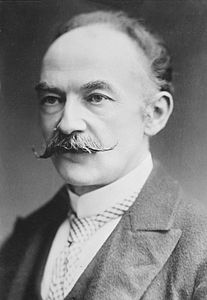Analysis of The Dream-Follower
Thomas Hardy 1840 (Stinsford) – 1928 (Dorchester, Dorset)
A dream of mine flew over the mead
To the halls where my old Love reigns;
And it drew me on to follow its lead:
And I stood at her window-panes;
And I saw but a thing of flesh and bone
Speeding on to its cleft in the clay;
And my dream was scared, and expired on a moan,
And I whitely hastened away.
| Scheme | XAXA BCBC |
|---|---|
| Poetic Form | Quatrain |
| Metre | 011111001 10111111 0111111011 01110101 0111011101 101111001 01111001101 01101001 |
| Closest metre | Iambic pentameter |
| Characters | 319 |
| Words | 66 |
| Sentences | 2 |
| Stanzas | 2 |
| Stanza Lengths | 4, 4 |
| Lines Amount | 8 |
| Letters per line (avg) | 29 |
| Words per line (avg) | 8 |
| Letters per stanza (avg) | 114 |
| Words per stanza (avg) | 32 |
Font size:
Submitted on May 13, 2011
Modified on March 05, 2023
- 19 sec read
- 94 Views
Citation
Use the citation below to add this poem analysis to your bibliography:
Style:MLAChicagoAPA
"The Dream-Follower" Poetry.com. STANDS4 LLC, 2024. Web. 30 Apr. 2024. <https://www.poetry.com/poem-analysis/36506/the-dream-follower>.


Discuss this Thomas Hardy poem analysis with the community:
Report Comment
We're doing our best to make sure our content is useful, accurate and safe.
If by any chance you spot an inappropriate comment while navigating through our website please use this form to let us know, and we'll take care of it shortly.
Attachment
You need to be logged in to favorite.
Log In